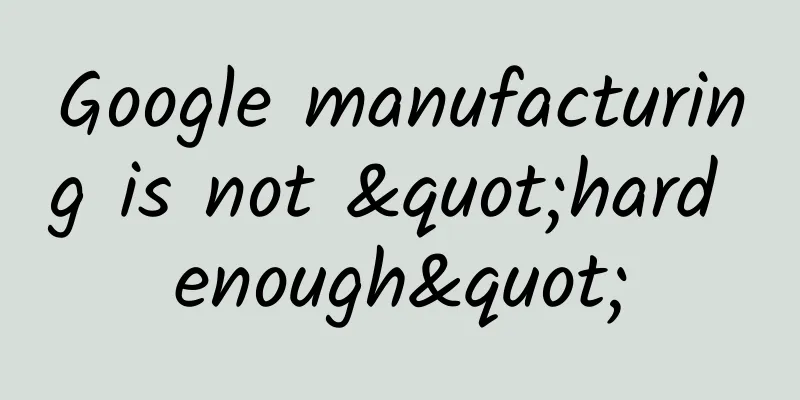Google manufacturing is not "hard enough"

|
"I wonder who dares to say that the iPhone's memory is inferior to that of Android flagships this time!" This was a slightly sarcastic remark made by a friend after the much-anticipated release of Google Pixel 3. Perhaps, many mobile phone users are paying attention to this Google flagship phone, which is the worst kept secret in history. After being exposed by various big Vs and even unboxing videos appeared on the Internet, Google finally officially released the Pixel 3 and Pixel 3 XL in New York in the early morning of the 10th. But unfortunately, after the official release of the product, it seems to have only increased users' disappointment with this "son" of Google. AI and cameras can’t save this ugly guy Before the official launch, the Pixel 3 series was exposed from all angles. Faced with such an ugly product, many people hoped that Google would come up with a refreshing flagship product in the second half of 2018. Who would have thought that the product that finally appeared at the launch was the ugly product that was previously exposed. If last year's Pixel 2 was a product that had already been finalized before Google took over the Pixel team from HTC, then this year's Pixel 3 can be regarded as the first smartphone that Google truly made itself. For this reason, countless consumers around the world have always placed high hopes on it, but this Pixel 3 is a big disappointment in terms of both ID design and hardware configuration, and the only bright spot is the photography aspect. This time, the Pixel 3 series continues the consistent advantages of the previous Pixel series in terms of shooting and software, presenting excellent camera functions and smart enough AI technology. The Pixel 3 series does not carry the mainstream rear dual-camera or triple-camera solutions on the market, but continues to choose a single main camera (12.2 million pixels) like the previous generations. Looking at the global smartphone market, Google is probably the only one that has the strength to do so. In last year's Pixel 2 series, in order to improve the performance of the camera, Google and Intel jointly developed a custom image processing unit called Pixel Visual Core, which is specifically designed to handle various AI shooting needs. In this year's Pixel 3 series, this processor has also been updated. According to Google officials, the new generation of processors has a 40% faster computing speed than the previous generation; at the same time, the excellent AI technology can also distinguish the various scenes in the photo in real time, so that the Pixel 3 series can achieve a blur effect that is not inferior to dual-camera. However, in this age of appearance, it is obviously unrealistic to win the hearts of the majority of mobile phone users with just this point. We can get a glimpse of this from the not-so-excellent market performance of the previous generations of Pixel series. From the ID design point of view, although the Pixel 3 screen has the standard 18:9 aspect ratio in the full-screen era, the upper and lower "aircraft carrier" borders instantly bring people back to the 16:9 full-screen era two years ago. The Pixel 3 screen has a three-section design, and the Pixel 3 XL follows suit with a notch screen on the forehead. As ordinary consumers, we are not good at making too many comments on smartphone ID design. After all, the success or failure of appearance design is often a matter of opinion. However, if we put the two models of the Pixel 3 series into the current flagship smartphone field, compared with those competitors full of design, even if they are not the ugliest, they are definitely the most non-mainstream. To put it more seriously, from the perspective of appearance design, without considering the blessing of the Google brand, the design of many thousand-yuan phones in the domestic market is better than it. After all, it is already October 2018. From the configuration point of view, except for the display and battery, Google Pixel 3 and Pixel 3 XL are basically the same. Both phones use the Snapdragon 845 chipset, but unlike many competing products with a full-blooded Snapdragon 845, the Pixel 3 series is equipped with a low-blooded version of the 845. This time, the processor of the Pixel 3 series was downclocked to 2.5GHz for the large core and 1.6GHz for the small core. For this practice, Google explained that it was to reduce battery consumption (perhaps only Google can do this by sacrificing processor performance to reduce power consumption and increase battery life). In terms of memory, the Pixel 3 series is equipped with 4GB RAM. You read that right - 4GB RAM for the entire series. The iPhone has already used 4GB RAM, and the Android camp has begun to popularize 6GB RAM even for thousand-yuan phones (8GB RAM for flagship phones has almost become a consensus), and 10GB RAM phones are about to be launched. At this moment, Google has only equipped its flagship series with 4GB RAM? Even when the Android ecosystem abroad is not as bloated as that in China, this seems a bit stretched, not to mention that this is a flagship model, which is why the friend complained angrily at the beginning. Therefore, apart from the excellent camera and the "not soft enough" software ecosystem, the new generation of Pixel is still far behind the flagship products of other competitors. This month, a large number of new generation "slider" full-screen models will be launched. In the face of a new round of innovation in smartphones, facing competitors with excellent designs and "higher hardware", it is conceivable how difficult it will be for Google to break into the market with such an "ugly guy". After every Google hardware launch, many domestic fans complain that they cannot buy Pixel products in the domestic market. But based on the current product strength of the Pixel series, how many people would buy it even without this threshold? Apart from speakers, hardware has always been Google's nightmare From mobile phones to PCs to headphones, glasses, cameras, smart speakers, etc., Google's desire for hardware seems to be consistent. However, as a standard Internet company, Google is unrivaled in the software field, but in the field of hardware, Google seems to have never found its own "doorway". Looking at Google's hardware development history over the years, smart speakers that catch up with the AI trend seem to be its only bright spot. For many years, Amazon's Amazon Echo has almost monopolized the entire European and American smart speaker market. But last year, according to data from market research company Strategy Analytics, thanks to its leading AI technology, Google Home's shipments are gradually approaching Amazon Echo. Data shows that Amazon's smart speaker market share has dropped from 75% in the second quarter of 2017 to 41% in the second quarter of this year; Google's market share has soared from 0.6% a year ago to 27.6%, an increase of 420%. However, Google Home is the only product that Google has managed to raise its head in the hardware field in recent years. Other products, such as mobile phones, PCs, glasses, etc., have always been well received but not popular. Take the most popular smartphone as an example. Since the first launch of Nexus One in 2010, Google has been on the road of smartphones for 8 years. But to this day, Google's phones are still a niche in the niche of the smartphone market. In terms of sales, according to Pixel sales data released by IDC research director Francisco Jeronimo, Google shipped 3.9 million Pixel and Pixel 2 devices in 2017. Sales of less than 4 million units are obviously a bit embarrassing for a giant like Google. This annual performance is not as good as the weekly sales of iPhone products in the same period, not to mention Samsung, Huawei, OV and other competitors in the Android camp. There is no doubt that Google has been losing money in the smartphone sector for eight consecutive years. Perhaps only a giant with deep pockets like Google can accept this. Judging from the Pixel 3 series that has been released so far, Google's loss trend is likely to continue. In addition to smartphones, Google's PCs, glasses, cameras and other hardware devices are also on the edge of the market. However, judging from Google's investment in the Made By Google conference in the past two years, Google still has good expectations for the future of the hardware market and is prepared for long-term investment. Rick Osterloh, head of Google's hardware department, said, "It will take a long time to build Google's hardware product line into a well-known global smart hardware brand, but we are ready for a protracted war. We are very clear that this is something we must do." Such a decision has its profound meaning. In the coming era of artificial intelligence, the trend of the Internet of Everything will be more obvious. In order to better integrate users into its own ecological closed loop, in addition to having a good software ecosystem, hardware carriers are also indispensable. The relationship between Apple and its fans is a typical ecological environment, so Google also hopes to achieve this result. Simply being a software service provider cannot meet Google's growing market demand. They need better hardware as a medium to showcase Google's technological strength. Only by combining AI, software, and hardware can we bring users the best experience and fully integrate them into our own ecological closed loop. Google has now achieved the best in AI and software, and it also believes that it has the strength to support all its investment in hardware research and development. The only thing that puzzles the industry is when will the time come for Google to use both soft and hard tactics? |
<<: Investigation into suspected Apple ID leak
>>: Can AR glasses allow Cook to break through the influence of Jobs?
Recommend
I am a tomb keeper in Xinzheng
An anti-tomb-robbing novel that makes your blood b...
The latest Douyin live streaming sales operation manual in 2020!
Live streaming sales has never been an easy task....
The mosquito repellent toilet water also needs a pesticide "license"
Many mosquito repellent and mosquito killing prod...
Should you eat first or brush your teeth first when you wake up in the morning? This is actually a big question!
What is the first thing to do when you wake up in...
The partner of Poison Tongue Movies personally teaches the "TikTok Hot Content Fan Growth Course" and discloses the secrets of fan growth for the first time
Training course content: 50 million big Douyin ac...
"Fan Hua" made pork ribs and rice cakes popular. Although they are delicious, what should you do if you eat too much? Do you know?
Question: In the hit drama "Flowering",...
Summary of methods for upgrading Windows 7/8.1 to Windows 10
On July 29, 2015, Microsoft will release the offi...
Ukrainian birthday gifts, how much does it cost to send birthday wishes to Ukrainian beauties?
“What’s a good birthday gift for a friend?” [WeCh...
Appendix, wisdom teeth, coccyx...Why do humans always have some strange evolutionary remnants?
© Getty Images Leviathan Press: It's said tha...
Second-class e-commerce advertising | 15 product cases in 7 categories!
The hot August gathers the enthusiasm of midsumme...
The highest level red alert, Typhoon "Sura" is approaching my country with wind and rain! Please take precautions in these areas!
At 6:00 on August 31, the Central Meteorological ...
From Tencent Zhihui to social advertising, how native advertising can help precision marketing
Tencent products, a high-quality performance mark...
If you use the electric eel's electricity to shock an electric eel, will the electric eel be electrocuted to death?
If you use an electric eel to shock an electric e...
Introduction and Use of Cosmetics
Introduction to cosmetics and their uses: Cosmeti...
2022 Virtual Project Operation Guide, Newbies Build a Store with Monthly Income of Over 10,000
2022 Virtual Project Operation Guide, Introductio...









